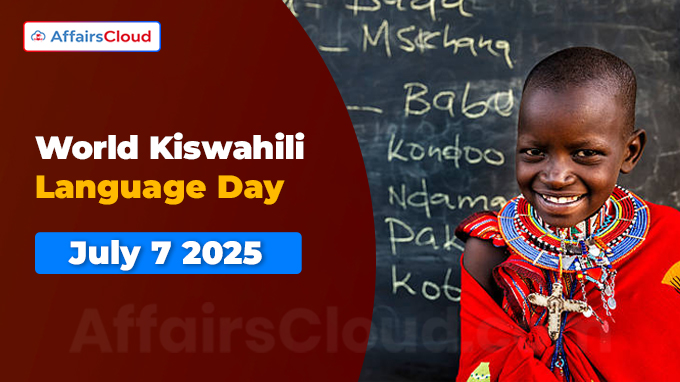 The United Nations Educational, Scientific and Cultural Organization (UNESCO) annually observes World Kiswahili Language Day on July 7 across the globe. The Day highlights the role of Kiswahili, one of the most widely used languages of the African linguistic family, in promoting unity, peace, and cultural exchange.
The United Nations Educational, Scientific and Cultural Organization (UNESCO) annually observes World Kiswahili Language Day on July 7 across the globe. The Day highlights the role of Kiswahili, one of the most widely used languages of the African linguistic family, in promoting unity, peace, and cultural exchange.
- July 7, 2025 marked the 4th observance of World Kiswahili Language Day.
Theme:
The 2025 theme for World Kiswahili Language Day is “Kiswahili: A Bridge for Cultural Diversity and Intercultural Dialogue”, emphasizes Kiswahili’s role in connecting diverse cultures across Africa and beyond.
Background:
i.On July 7, 1954, the Tanganyika African National Union (TANU), led by Julius Nyerere, adopted Kiswahili as a unifying language during Tanzania’s struggle for independence.
ii.On July 7, 2000, the East African Community (EAC) was re-established to foster regional cooperation among Kiswahili-speaking nations.
iii.In November 2021, UNESCO, during its 41st session of the General Conference held in Paris (France), adopted Resolution 41 C/61, officially proclaiming 7 July every year as World Kiswahili Language Day.
iv.The first-ever observance of the Day was held on 7 July 2022.
Why 7 July?
i. On 7 July 1954, the Tanganyika African National Union (TANU), led by Julius Nyerere, Tanzania’s first President, adopted Kiswahili as a unifying language during the country’s independence movement.
ii.Also, on 7 July 2000, the East African Community (EAC) was re-established to promote unity and cooperation among East African nations where Kiswahili is commonly spoken.
Significance:
i.Promotes Kiswahili as a tool for peace, multiculturalism, and regional unity.
ii.Aligns with the United Nations (UN) Agenda 2030 for Sustainable Development and the African Union (AU) Agenda 2063: “The Africa We Want”
iii.Recognized as the first African language by the UN, with over 230 million speakers worldwide.
About Kiswahili Language:
i.Kiswahili, also known as Swahili, is a Bantu language from the Niger-Congo language family.
ii.The language has been enriched by influences from Arabic, Portuguese, and English.
iii.It is considered one of the 10 most widely spoken languages globally.
iv.Kiswahili serves as a lingua franca in East, Central Africa and the Middle East, and an official language of the AU, EAC, and Southern African Development Community (SADC).
v.Kiswahili is the only African language represented within the United Nations Directorate of Global Communications (DGC), with a dedicated Kiswahili language unit established in the 1950s.
Note: According to UNESCO, while there are about 8,324 known languages worldwide, only around 7,000 are actively spoken today.
2025 Events:
i.On 7 July 2025, UNESCO Headquarters in Paris hosted a panel titled “Kiswahili: A Bridge for Cultural Diversity and Intercultural Dialogue,” organized in collaboration with East African delegations.
ii.The EAC in collaboration with the Republic of Rwanda, hosted the 4th official celebration of World Kiswahili Language Day in Kigali, the capital of Rwanda.
- Events included cultural performances, youth mentorship, and academic dialogues on Kiswahili’s role in education and sustainable development.
About United Nations Educational, Scientific and Cultural Organization (UNESCO):
Director General (DG) – Audrey Azoulay
Headquarters – Paris, France
Founded – 1945
Member Nations – 194




